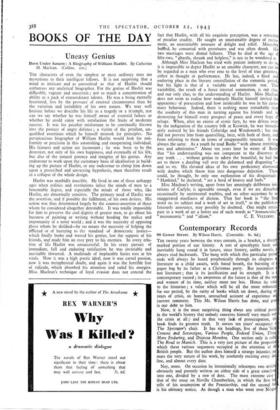BOOKS OF THE DAY
Uneasy Genius
THE characters of even the simplest or most ordinary men are mysterious to their intelligent fellows. It is not surprising that a mind as intricate and as unresolved as that of Hazlitt should embarrass any analytical biographer. For the genius of Hazlitt was diffusible, vagrant and uncertain ; not so much a concentration of ability as a pack of extraordinary talents. He was a being eternally frustrated, less by the pressure of external circumstance than by the variation and irritability of his own nature. We may well hesitate before we describe his life as a tragedy or a triumph, nor can we say whether he was himself aware of essential failure or whether he could enjoy with satisfaction the fruits of moderate success. It was his peculiar misfortune to be continually thrown into the posture of angry 'defence ; a victim of the petulant, un- qualified assertions which he himself mistook for principles. No perspicacious biographer of William Hazlitt would look for uni- formity or precision in this astonishing and exasperating individual. His features and action are inconstant ; he was born to be the destroyer, not only of his own happiness, and eventually of his life, but also of the natural potency and integrity of his genius. Any endeavour to work upon the customary basis of idealisation in build- ing up the picture of Hazlitt, or any endeavour to clamp him down upon a prescribed and unvarying hypothesis, must therefore result in a collapse of the whole design.
Hazlitt was morbidly irascible. He lived in one of those unhappy ages when politics and revolutions infect the minds of men to a lamentable degree, and especially the minds of those who, like Hazlitt, are abnormally sensitive. The primary need of Hazlitt was the assertion, and if possible the fulfilment, of his own desires.. His action was thus determined largely by the counter-assertion of those whom he considered altogether detestable. It was totally impossible for him to preserve the cool dignity of greater men, to go about his business of painting or writing without heeding the malice and importunity of a noisy world ; and it was the necessity of opposing ,;hose whom he disliked—by no means the necessity of helping the afflicted or of hurrying to the standard of democratic justice— which finally broke and wasted his genius, lost the support of his friends, and made him an easy prey to his enemies. In every rela- tion of life Hazlitt was unsuccessful. In his crazy pursuit of immediate, full and enduring satisfaction he was invariably and inevitably thwarted. A multitude of implacable furies tore at his vitals. Now it was a high poetic ideal, now it was carnal passion, now it was metaphysical doubt, and again it was the horrible fear of ridicule, which absorbed his attention 'and ruled his energies. Miss Maclean's technique of loyal evasion does not conceal the fact that Hazlitt, with all his exquisite perception, was a sensualist of peculiar crudity. He sought an unattainable degree of excite- ment, an unattainable measure of delight and relief. Miserably baffled, he consorted with prostitutes and was often drunk. His two marriages were dismal failures. That he died at the age of fifty-two, " ghastly, shrunk and helpless," is not to be wondered at.
Although Miss Maclean has tried with patient industry to do so, it is impossible to depict Hazlitt as an amiable character, nor can be be regarded as a man who ever rose to the level of true greatness, either in thought or performance. He has, indeed, a fixed and enduring place in the literary constellation of the romantic period, but his light is that of a variable and uncertain star. This variability, the result of a fierce internal commotion, is out clue, and our only clue, to the understanding of Hazlitt. Miss Maclean does not seem to realise how zealously Hazlitt himself invited the appearance of persecution and how intolerable he was in his custo- mary behaviour. Indeed, there is nothing more remarkable than the assiduity of this man in turning against his friends and in destroying for-himself every prospect of peace and every hope of refuge. When, after an excess of erotic fury, he was driven away by the indignation of the country folk at Keswick, he was immedil, ately assisted by his friends Coleridge and Wordsworth ; but this did not prevent him from quarrelling, later, with both of them, and from referring to them in terms of unappeasable rancour. It was always the same. As a youth he read Burke " with almost trembling awe and admiration." About ten years later he wrote of Burke that " his understanding was not competent to the discovery any truth . . , without genius to adorn the beautiful, he had the art to throw a dazzling veil over the deformed and disgusting"— and so on. His elevated ideas of his own proficiency alternate with doubts which threw him into dangerous dejection. Ther could, he thought, be only one explanation nf his disquietude: " Mankind," he declared, " are a herd of knaves and fools."
Miss Maclean's writing, apart from her amazingly deliberate lint tations of Carlyle, is agreeable enough, even if we are disturbe occasionally by sentimental warbles, and on other occasions by a exaggerated manliness of diction. That her book is " the fin word on its subject and a work of art in itself," as the publish:
fatuously announce, may possibly be doubted. One might antic pate in a work of art a better use of such words as " homunculus,


























 Previous page
Previous page